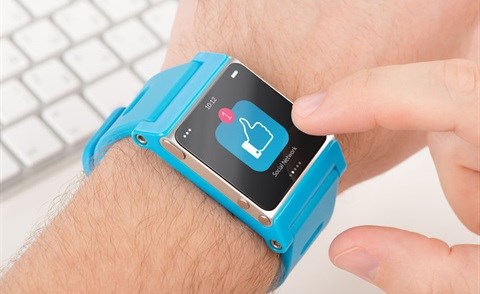Exploring the future of wearable technology
Wearable technology, wearables, fashionable technology, wearable devices, tech togs, or fashion electronics, as the name implies, are clothing and accessories incorporating computer and advanced electronic technologies. The designs often incorporate practical functions and features, but may also have a purely critical or aesthetic agenda.
Wearable technology is related to both the field of ubiquitous computing and the history and development of wearable computers. With ubiquitous computing, wearable technology share the vision of interweaving technology into the everyday life, of making technology pervasive and interaction friction less.
Through the history and development of wearable computing, this vision has been both contrasted and affirmed.
The calculator watch, introduced in the 1980s, was one original piece of widespread worn electronics. Ilya Fridman designed a Bluetooth headset into a pair of earrings with a hidden microphone.

Twitter users can wear a "Pocket Tweet" using a Java application and cutting out and applying a Twitter text bubble to a person's shirt, one example of Do-it-yourself wearable tech that was part of an art exhibit for the Wearable Technology AIR project in 2009.
ZED-phones stitch headphones into beanies and headbands allowing riders, snowboarders, drivers and runners to stay connected, hands-free, always.
Wearable technology has applications in monitoring and realtime feedback for athletes as well. The decreasing cost of processing power and other components is encouraging widespread adoption and availability.
According to Forbes, 71 per cent of 16-to-24 year olds globally, want wearable technology devices.
Digital Africa's drive for wearables
One of the topics that's high on the list for Africa's digital transformation is Wearable Technology. These are devices, unlike mobile phones, that are worn on the body and have built-in sensors to monitor certain functions (like steps taken or precise location) and then communicate information through Bluetooth and the cloud.
Bracelets, necklaces and garments that fuse utility with fashion, function with form, can make the daily life of Africans healthier, safer and keep them in better contact. They will enable everything from commerce to managing chronic illnesses. And they will revolutionise the fashion industry with clothing that interacts with the environment.
Although the wearables industry is still in its infancy in Africa, Nigeria inclusive, but the market is expected to skyrocket to $19bn by 2018, according to recent analytical report.
According to a 2014 International Data Corporation (IDC) report, "The worldwide wearable computing devices market (commonly referred to as 'wearables') will reach a total of 19.2 million units in 2014, driven primarily by complex accessories such as Fitbit devices, Jawbone's UP bracelet, and Nike+ FuelBand.
New accessories like the Apple Watch allow you to shop, exercise and get personal email and text notifications. You can even use your wrist band as your phone. Other smart accessories from companies including Misfit, Withings and Samsung are creating wearable platforms that will let customers do any number of things from taking a photo, to making a note, to paying a bill, to tracking heart rate, all from the wearable device. Finally, smart Wearables like Google Glass and Oculus Rift, though still being perfected, have the potential to meld the physical and virtual worlds in both the entertainment and business sectors.
Wearable technology devices are gaining more acceptance globally, and it is for this reason that Digital Africa is organising a conference in Abuja next month, to further sensitise Africans and Nigerians on the importance of wearables in today's digital age.
Africans' position
For Africans on the go, the power of wearables is transformative. Banking by touching your wrist, measuring an unborn child's vital signs with a small pendant, sending an emergency notification by tapping your earring, these are just some examples of wearable products that are in the market today. For the healthcare industry, wearables offer the ability to gain feedback about patients' personal physical state, such as blood pressure, heart beat, brainwaves, sleep, pregnancy, and body temperature. These are few of things that today's wearable devices can monitor.
Other more communications-based wearables can track family and loved ones especially those who are in any sort of imminent health of physical danger. They can detect environmental factors: providing information about everything from pollution levels to shopping and retail information. A wearable's functionality seems to be limited only by the imagination of the inventor.
"This is why we have created a series of insightful and thought-provoking presentations focusing on unleashing the potential for wearable technology throughout Africa and the world at the Digital Africa Conference & Exhibition holding next month," the organisers said in a statement.
Driving digital agenda for wearables
Veteran speakers explore and showcase these freshly evolving technologies that can boost the socio-economic development of Africa.
To bring the topic to life, this year's Digital Africa Conference & Exhibition will also feature the first Wearable Technology Fashion Show. It is expected to showcase everything from dresses and jackets to hats and handbags with wearables integrated into their design. The curated show will provide a live look at the latest marriage of fashion and tech and some of the designers who are marrying the two.
One of the conference's veteran speakers is Robin Raskin, founder of Living in Digital Times (LIDT).
Her team of technophiles bring together top experts and the latest innovations to showcase the intersection lifestyle and technology. Throughout the year, LIDT focuses on how technology enhances every aspect of human life through the eyes of today's digital consumer.
Raskin believes that Africa's current digital technology penetration level is deep enough to accommodate wearable technologies.
"In many ways new technologies like mobile payment systems and wearable trackers have an easier adoption trajectory in Africa than in markets that are hampered by old infrastructure without high speed broadband. Africa's embrace of the mobile wireless market puts it on the fast track towards Wearables. And now that Wearables are more practical, functional and integrate easily with existing mobile technologies the adoption curve will accelerate," she said.
Raskin suggests that the benefits of wearable technologies are many for the African consumer. In her words: "The ability to gain feedback about your own physical state- blood pressure, heart beat, brainwaves, sleep, pregnancy, illness will allow consumers to take control of their healthcare without relying solely on doctors. Most behavioural factors that lead to premature death can all be monitored and modified using devices, and hopefully effect outcomes."
Challenges of wearables
And fantastic as wearable technology devices could be, they still have their own challenges, which the conference seeks to address.
"That is not to say that the adoption of wearable technology does not have its challenges. Some Wearables are frivolous rather than useful; others are not rugged enough for wear, others have battery or data transfer issues and still others have a steep learning curve for the user," the organisers said. Raskin believes that a sensible approach to wearables will benefit Africa. "My hope is that the first smart wearable gadgets promote things we care about universally -staying in touch with loved ones and helping people adhere to medical and healthy lifestyle regiments. As wearables continue to become smaller and show up in new form factors, you will see them in everything from shoes to posture- monitoring belts, to bike helmets smart enough to detect ambient surroundings," she said.
Cost implication
As for price, the cost of wearables is a fraction of the cost of what a laptop or desktop PC was just a few years ago, says Raskin. "A commitment to a cloud-based, high speed broadband environment will drive the cost of devices down because expensive things like storage and processing are offloaded to the infrastructure."
It is no doubt that wearable technology has caught the interest of the world. This year's Consumer Electronics Show (CES) which was held in Las Vegas, USA, in January and the recent Mobile World Congress in Barcelona, Spain demonstrate how fast the market is developing. As Africa is witnessing a fast growth in the technology market, it is expected that it will not take long before wearable technology makes a heavy show on the continent.
Source: allAfrica

AllAfrica is a voice of, by and about Africa - aggregating, producing and distributing 2000 news and information items daily from over 130 African news organisations and our own reporters to an African and global public. We operate from Cape Town, Dakar, Lagos, Monrovia, Nairobi and Washington DC.
Go to: http://allafrica.com/








